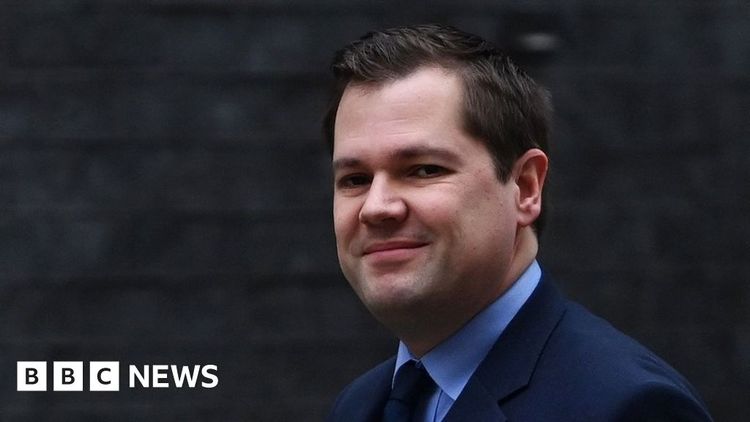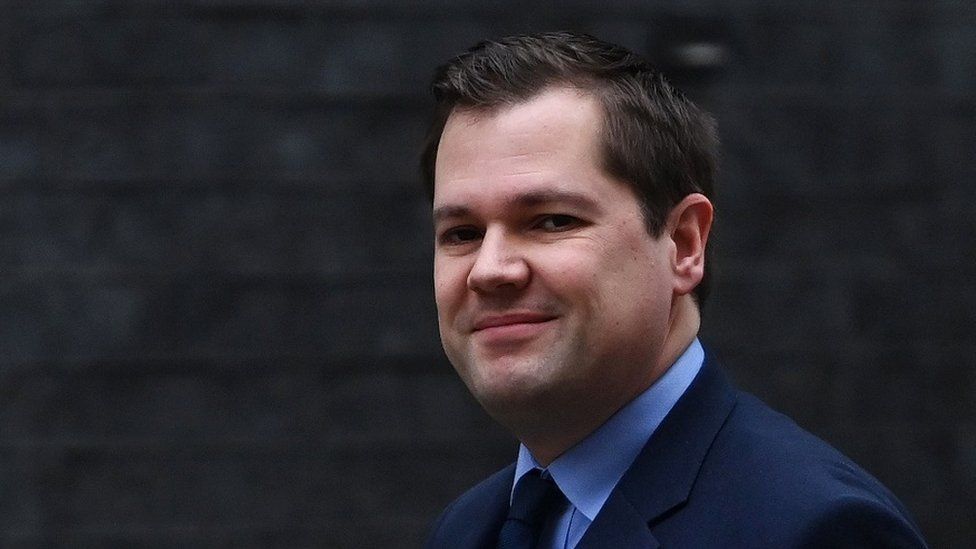Robert Jenrick resigns as immigration minister over Rwanda legislation

Robert Jenrick has stepped down from his role as immigration minister, citing that the government's urgent legislation regarding Rwanda falls short in its effectiveness.

He suggested that the scheme needed more robust safeguards to prevent a constant cycle of legal disputes that could potentially bring the whole program to a standstill.
The authorities stated that the proposed legislation, which was introduced beforehand, explicitly states in British law that Rwanda is a secure nation for individuals seeking refuge.
However, it falls just shy of fulfilling the wishes of certain members on the conservative end of the political spectrum.
In the resignation letter that Mr. Jenrick wrote to the prime minister, he mentioned that during their talks about the newly suggested urgent laws, the prime minister has slowly shifted towards his stance. He was appreciative of this change.
However, I cannot support the legislation suggested presently in the House of Commons because I don't think it would give us the highest probability of achieving success.
He mentioned that the proposed law was an accomplishment of optimism despite prior disappointments.
The head of government expressed sadness about Mr. Jenrick's departure because they shared the same goal of sending flights to Rwanda to put an end to boat migration.
Mr. Sunak wrote to his past immigration minister, expressing his assurance that his plan for Rwanda would be successful. He also mentioned that he was concerned that the immigration minister's departure was due to a misinterpretation of the circumstances.
He said that if we were to completely remove the courts, the entire system would fail.
The government of Rwanda has made it crystal clear that they do not agree with the UK adopting a plan based on laws that may be breaking international legal obligations.
The objective behind the proposal to relocate certain refugees to Rwanda is to discourage individuals from making the risky and unsafe journey across the English Channel in dinghies.
However, the plan has faced multiple postponements due to legal disputes. To date, there have been no instances of the UK transporting any asylum seekers to this region of Africa.
According to Mr Jenrick, the legislation put in place is the final chance for the government to showcase their determination in preventing small boats from crossing the borders.
He stated that the current draft of the report is not sufficient enough.
He stated: "I decline to be another political figure who offers assurances regarding immigration to the British citizens and then fails to fulfill them."
Mr. Jenrick, who endorsed Rishi Sunak's bid for leadership, abstained from directly rebuking the prime minister and instead lauded him for steadying the nation "despite facing significant challenges".
He mentioned that he would continue to fully support the Prime Minister from his position on the backbenches.
When a minister who was once an important supporter leaves, it is a setback for Mr. Sunak, especially since the government had been focusing on migration issues this week.
Yvette Cooper, the shadow home secretary of the Labour party, stated that the recent resignation of the immigration minister is proof of the immense turmoil within the Conservative party and the failure of Rishi Sunak's leadership. Cooper pointed out that the resignation happened as Sunak was presenting his new plan for Rwanda in the House of Commons. The shadow home secretary also expressed skepticism regarding the effectiveness of the immigration minister's decision.
Suella Braverman has communicated a message to her political party, urging them to take decisive action on the problem of illegal migration in the UK. She emphasized that the time for action is now, and there may not be another opportunity in the future.
After the government released the draft bill, rumors about Mr. Jenrick resigning began to circulate.
The new law is designed to tackle the issues that the Supreme Court had raised. The court had declared the proposal to relocate certain refugees to Rwanda as illegal last month.
The proposed legislation, that requires approval from the Parliament, directs the judiciary to disregard essential aspects of the Human Rights Act so as to bypass the previous verdict passed by the Supreme Court.
Furthermore, it directs the judicial system to disregard any other laws set forth by the UK or globally, such as the Refugee Convention on an international level, if they interfere with the process of sending individuals back to Rwanda.
Nevertheless, it doesn't extend to the extent that certain Conservative Members of Parliament desired.
Suella Braverman, who previously held the position of Home Secretary, along with her followers, urged for the annulment of the complete Human Rights Act, along with the European Convention on Human Rights (ECHR), the Refugee Convention, and every other international rule.
When Mrs Braverman was in government, Mr Jenrick was her supporter.
The proposed law permits ministers to disregard a provisional directive from the European Court of Human Rights located in Strasbourg, which requires them to stop a flight to Rwanda, if an individual case is still under review.
However, it does not go far enough to grant authority to terminate the entire ECHR.
Moreover, it enables immigrants to lawfully contest their deportation to Rwanda based on particular personal reasons. This is only if they can verify that boarding a plane would put them in actual danger of significant harm.
Someone who knows Mrs Braverman well commented that the bill has serious issues and would likely face delays due to legal challenges for an extended period of time.
Yet, should the government have conceded to her requests, it could have sparked opposition from moderate Conservatives.
Over 100 Conservative MPs in the One Nation group cautioned that going beyond the ECHR was an issue many party members would not budge on.
The team was pleased that the preliminary version of the law would still conform to the UK's global obligations, which preserve the standards of justice.
The preliminary legal document acknowledges the possibility that it may not align with the European Convention on Human Rights (ECHR).
This implies that ministers have been informed by the lawyers of the government that these actions might still face legal disputes.
Who's Robert Jenrick?
Before he entered politics as the Conservative MP for Newark in a by-election in 2014, Mr. Jenrick worked as a solicitor.
Boris Johnson appointed him as the housing secretary for the cabinet in 2019, and later he represented the government at the daily Covid press briefings.
The individual who is 41 years of age and has three children was once a minor health minister in Liz Truss's administration, even though he supported Rishi Sunak for the Conservative Party's leadership.
During his time as Mr Sunak's immigration minister, he continuously advocated for stricter policies regarding legal and illegal immigration. He frequently expressed his dissatisfaction with the large numbers of immigrants in both categories.
There were several disputes that revolved around him, one of which was regarding the authorization of Richard Desmond's planning consent, who had donated to the Conservative Party.





































































